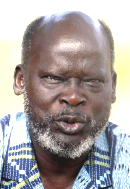INTERVIEW-Sudan’s Garang says would not allow Darfur war
By Robert Waweru
 NATENG, Sudan, July 11 (Reuters) – Southern Sudanese rebel chief John Garang warned Khartoum on Sunday he would not allow a planned interim government to continue what he called the “very serious crime” of state-organised attacks on Darfur’s civilians.
NATENG, Sudan, July 11 (Reuters) – Southern Sudanese rebel chief John Garang warned Khartoum on Sunday he would not allow a planned interim government to continue what he called the “very serious crime” of state-organised attacks on Darfur’s civilians.
Garang, set to become Sudan’s first vice-president under a planned accord ending a separate war in the south, added in an interview that Khartoum was using the same techniques in Darfur that it used for 21 years against his forces in the south.
“If we are to form a new government of national unity — and that’s what the agreement says — we obviously will not allow that government to fight its own citizens in Darfur,” he told Reuters in Nateng in the south’s Eastern Equatoria province.
“There’s no way you can make peace for southern Sudan while you also make war in Darfur.”
Garang, head of the Sudan People’s Liberation Army (SPLA) and its political wing the Sudan People’s Liberation Movement, said only sustained international pressure would make Khartoum honour commitments it made this month to end Darfur violence.
“If there are no consequences for non-compliance then it will not change anything,” he said. “If there is no just political settlement in Darfur it would be positive for the international community to impose whatever pressure necessary to bring about a just peace in Darfur.”
Negotiators from the SPLA and Sudan’s Islamist government are putting the finishing touches to peace accords signed on May 26 aimed at ending a 21-year-old war which killed two million people and cut Africa’s largest nation in two.
Under the deal, which does not cover the conflict in Darfur, the SPLM and the ruling National Congress Party will be the main partners in a national unity government. Mediators have said a final deal could be concluded within two months.
Garang has long expressed sympathy with the black African rebels in Darfur, whose demands for a bigger political say in Khartoum and more state resources are similar to the SPLA’s own.
After long conflict between Arab nomads and black African villagers, a rebellion broke out in Darfur last year. U.S. and U.N. officials have accused the mounted Arab Janjaweed militia of a campaign of ethnic cleansing against the villagers.
Local people and human rights groups have alleged Khartoum is backing the militia, a charge it denies.
Garang insisted the Janjaweed were “part and parcel of the government”.
“The Janjaweed are government counter-insurgency forces. It is the exact same strategy and tactics they have used in the south…The difference is that instead of having counter-insurgency forces recruiting individuals, the government is using whole tribes against other tribes.”
“The government is supposed to be for all the ethnic groups. If the government uses one ethnic group against another, this is a very serious crime.”
Often depicted as a conflict between the Arab, Muslim north and black animist or Christian south, the war in the south has been complicated by divisions over oil and political power.
Many Sudanese hope the agreement in the south will provide impetus for a negotiated settlement in Darfur.
“Peace in the south must also translate into other areas where there is war… The situation in the east is also very bad,” Garang said, referring to rebels of the Beja Congress party who accuse Khartoum of neglecting their poor area.
